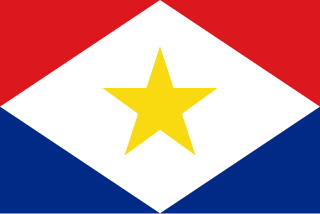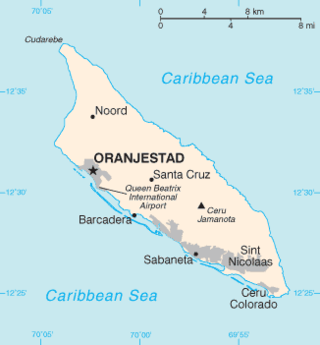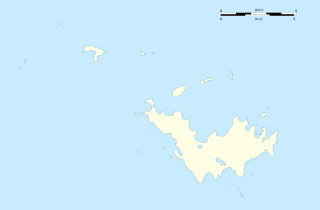
Saba is a Caribbean island and the smallest special municipality of the Netherlands. It consists largely of the active volcano Mount Scenery, which at 887 metres (2,910 ft) is the highest point of the entire Kingdom of the Netherlands. The island lies in the northern Leeward Islands portion of the West Indies, southeast of the Virgin Islands. Together with Bonaire and Sint Eustatius it forms the BES islands, also known as the Caribbean Netherlands.

Sint Eustatius, known locally as Statia, is an island in the Caribbean. It is a special municipality of the Netherlands.
This is a list of hospitals in North America for each sovereign country. territory, and dependency.

The Caribbean Netherlands are the three public bodies of the Netherlands that are located in the Caribbean Sea. They consist of the islands of Bonaire, Sint Eustatius and Saba, although the term "Caribbean Netherlands" is sometimes used to refer to all of the islands in the Dutch Caribbean. In legislation, the three islands are also known as Bonaire, Sint Eustatius and Saba or the BES islands. The islands are currently classified as public bodies in the Netherlands and as overseas countries and territories of the European Union; thus, European Union law does not automatically apply.
Same-sex marriage has been legal in Bonaire, Sint Eustatius and Saba since 10 October 2012, the effective date of legislation passed by the States General of the Netherlands enabling same-sex couples to marry.

The first cases of the COVID-19 pandemic of coronavirus disease 2019 in North America were reported in the United States on 23 January 2020. Cases were reported in all North American countries after Saint Kitts and Nevis confirmed a case on 25 March, and in all North American territories after Bonaire confirmed a case on 16 April.

The COVID-19 pandemic in Curaçao was a part of the ongoing global viral pandemic of coronavirus disease 2019 (COVID-19), which was documented for the first time in Curaçao on 13 March 2020. The case was a 68-year-old man who was on vacation from the Netherlands. By 9 July 2020, all cases resolved. On 15 July, a new case was discovered, and on 6 August all cases resolved again briefly until 10 August.

The COVID-19 pandemic in Aruba was a part of the ongoing global viral pandemic of coronavirus disease 2019 (COVID-19), which was documented for the first time in Aruba on 13 March 2020. As of 29 May, all cases recovered. On 29 June, two new cases were discovered.

The COVID-19 pandemic in Saint Barthélemy was a part of the ongoing global viral pandemic of coronavirus disease 2019 (COVID-19), which was confirmed to have reached the French overseas collectivity of Saint Barthélemy on 1 March 2020. The last positive case was on 31 March 2020. On 21 April, the last case recovered. Between 18 and 24 July, a new case was imported.

The COVID-19 pandemic in French Saint Martin was a part of the ongoing global viral pandemic of coronavirus disease 2019 (COVID-19), which was confirmed to have reached the French overseas collectivity of Saint Martin on 1 March 2020. The island is split in a Dutch and French part, with the main airport on the Dutch side and the major harbour on the French side. The first positive test was a French couple from Saint Martin who returned from France via Saint Barthélemy on 1 March 2020. They were screened and tested positive on the airport, but are counted on the French count. The island had a population of 35,334 in 2017.

The COVID-19 pandemic in Sint Maarten, also known as the coronavirus disease 2019 pandemic in Sint Maarten,was a part of the ongoing viral pandemic of coronavirus disease 2019 (COVID-19), which was confirmed to have reached the Dutch Caribbean island of Sint Maarten on 17 March 2020. By 15 June, all cases recovered. On 1 July, a new case had been discovered, which resolved on 3 July On 15 July, a 79th case was discovered.

The COVID-19 pandemic in Anguilla is part of the ongoing global viral pandemic of coronavirus disease 2019 (COVID-19), which was confirmed to have reached the British Overseas Territory of Anguilla on 26 March 2020. On 26 April 2020, all patients had recovered and on 22 November a new imported case was announced.
The COVID-19 pandemic in Saba is part of the ongoing global viral pandemic of coronavirus disease 2019 (COVID-19), which was confirmed to have reached the Dutch Caribbean island of Saba on April 12, 2020. At the beginning of the pandemic, the island had a population of just over 1,900 people. As of 12 May, all cases were reported to have recovered. On 1 August, two new cases were imported which resolved on 9 September.

The COVID-19 pandemic in Bonaire is part of the ongoing global viral pandemic of coronavirus disease 2019 (COVID-19), which was confirmed to have reached the Dutch Caribbean island of Bonaire on 16 April 2020. On 28 April, all cases recovered. On 14 July, two new cases were discovered. On 13 August, all cases recovered.

Island Council elections were held in Sint Eustatius on 21 October 2020. Sint Eustatius is a special municipality of the Netherlands. The elections were originally to be held on 20 March 2019, but were postponed due to administrative intervention by the Dutch government. On 23 September 2019, a new election date was announced.
Island council elections were held in the Netherlands Antilles on 7 April and 12 May 1995 to elect the members of the island councils of its five island territories. The election was won by the Bonaire Democratic Party in Bonaire, the Party for the Restructured Antilles in Curaçao, the Saba Democratic Labour Movement in Saba, the Democratic Party Statia in Sint Eustatius, and the Democratic Party in Sint Maarten.
Island council elections were held in the Netherlands Antilles on 9 May and 23 May 2003 to elect the members of the island councils of its five island territories. The election was won by the Bonaire Patriotic Union in Bonaire, the Workers' Liberation Front in Curaçao, the Windward Islands People's Movement in Saba, the Democratic Party Statia in Sint Eustatius, and the Democratic Party in Sint Maarten.
Island council elections were held in the Netherlands Antilles on 20 April 2007 to elect the members of the island councils of its five island territories. They were the last regular island council elections before the dissolution of the Netherlands Antilles in 2010.
Association football is a popular sport on the Caribbean island of Saba.
Frini Eveline Adelka Spanner is a Sint Eustatian politician and leader of the Democratic Party (DP). She is a member of the Island Council of Sint Eustatius.













